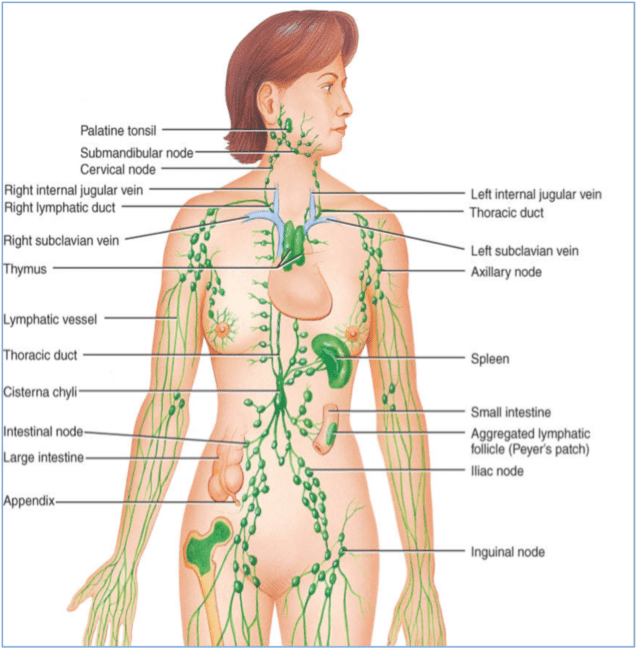Your lymphatic system is essentially your body’s “sewage processing plant”, which is responsible for removing waste, toxins, and other unwanted material out of your cells and tissues so they can be flushed out of your body. When your lymph stops flowing freely, it’s like having your garbage company go on strike. The garbage in your home begins to pile up—and the longer the strike, the higher the piles. If the strike goes on long enough, your home will become toxic and you’ll become sick. This is what happens with sluggish lymph: waste accumulates in your cells and tissues.
Unlike your blood, which has a beating heart to push it along, your lymph requires actual movement from you in order to keep it flowing. So, if you don’t move much, your lymph doesn’t move much either… and cellular “garbage” begins to pile up.
The lymphatic system is one of the most overlooked systems in the body, despite the fact that it plays a central role in your overall health. Keeping your lymphatic system in top shape is an important aspect in maintaining a healthy life. The lymph system is a circulatory system made up of a network of vessels that runs through your entire body. It contains lymphatic vessels, lymph nodes, lymph fluid and lymphocytes (specialized immune cells) which all work together to defend against infection and disease.
Lymph nodes are strategically located throughout the system for optimal performance, and are clustered in areas like the underarms, abdomen and neck. The tonsils, adenoids, spleen and thymus are all part of the lymphatic system.
Your lymphatic system performs the vital function of cleansing the fluid that surrounds the cells in your body by removing impurities and waste products. This process not only protects your body from toxins, but also allows cells in the body to function at their best.
Key Facts:
- The lymphatic system has three main roles: it is part of our immune system, maintains fluid balance and is essential for the absorption of fats and fat-soluble nutrients.
- Lymph vessels drain fluid from virtually all our tissues to control fluid balance and to deliver foreign material to the lymph nodes for assessment by immune system cells.
- The lymph nodes swell in response to infection caused by a build-up of lymph fluid, bacteria or other organisms and immune system cells.
- Lymph nodes may also become swollen due to inflammation and, rarely, cancer or other diseases or conditions.
- Lymph nodes are responsible for filtering lymph and providing part of the adaptive immune response to new pathogens – the part of our immunity that has a long “memory.”
- Disorders of the lymphatics include lymphedema, a form of swelling occurring when lymph has failed to drain through the lymph vessels.
- Swollen lymph nodes can indicate a response to foreign material such as from a nearby infection – this process is known as reactive lymphadenopathy.
- Lymph nodes can also become infected themselves, a condition known as lymphadenitis.
- If swollen lymph nodes do not return to their normal size, are hard or rubbery and difficult to move, are accompanied by fever, unexplained weight-loss, or difficulty breathing or swallowing, a check-up from a doctor is needed.
What happens when the lymphatic system can’t function properly?
An unhealthy lymphatic system can have a serious impact on your health. Poor lymph function is associated with fibromyalgia, multiple sclerosis, chronic fatigue syndrome, aches and pains, bloating and poor digestion. Studies have shown that an unhealthy lymph system can contribute to cellulite, fat deposits and obesity as well. If you eat too much processed food, get little exercise, have a lot of stress and are exposed to a lot of toxins, the lymphatic system can be overtaxed.

Figure 1. Lymphatic System
How can you keep your lymphatic system healthy?
Drink plenty of water
The lymphatic system depends on a constant supply of fluid, so it’s very important to drink at least eight glasses of water a day to keep it functioning at its best. Purified or filtered water is the best choice.
Choose healthy foods
Preservatives, artificial sweeteners, refined grains, excess sugar, chemicals and processed foods all put strain on the lymphatic system. Choose foods that are organic, whole and natural as much as possible.
Eat your fruits and veggies
Fruits and vegetables supply the lymphatic system with important vitamins, minerals, antioxidants and phytonutrients. The chlorophyll in green vegetables is especially beneficial to the lymphatic system.
Get your essential fatty acids
Healthy fats are necessary for the proper function of the lymphatic system. Good sources of essential fatty acids include fish or fish oil, pumpkin seeds, walnuts, almonds and avocados.
Stay active
When your muscles move, they essentially massage the lymphatic system and promote the flow of fluid through your lymph vessels. Regular exercise like stretching, yoga, daily walks and strength training are all great ways to keep those lymph juices flowing.
Practice deep breathing
Like exercise, deep breathing promotes the movement of fluid through the lymphatic system while providing it with fresh oxygen.
Take anti-inflammatory and anti-bacterial herbs
These herbs support immunity and help cleanse the lymphatic system. These should be used as part of a cleansing period lasting for about 2-4 weeks, one to three times per year.
Get a massage
Massage stimulates the lymph nodes and helps promote fluid movement in lymph vessels. Lymph drainage massage is especially supportive of the lymphatic system.
Relax in a sauna
One hour per week in the sauna or steam bath can facilitate detoxification and take some pressure off the lymphatic system.
Healthier is Smarter!
Sharon Edwards – BA, R(Hom), DNM, RNCP, CTT



